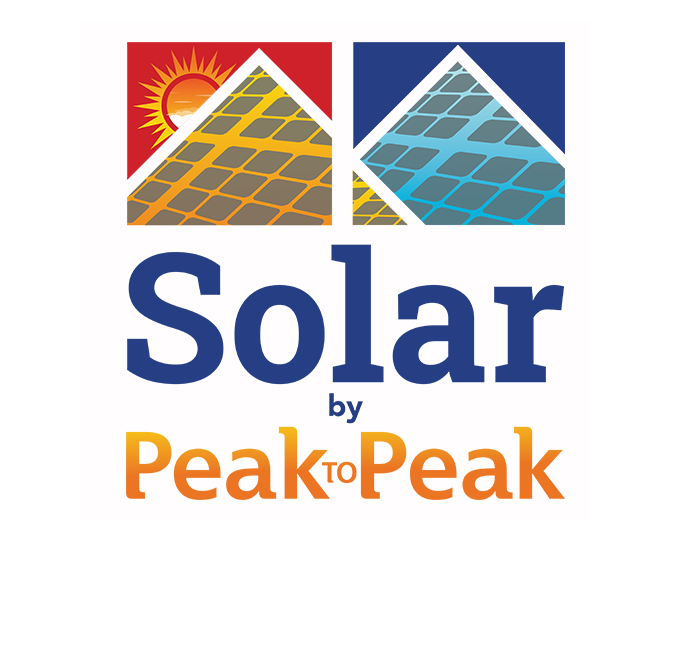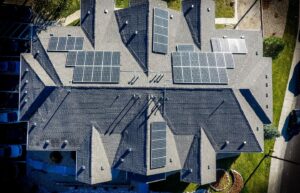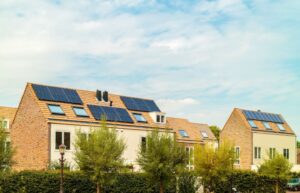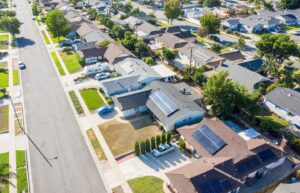Harnessing the sun’s energy isn’t just a trend—it’s a revolution. Imagine slashing your electric bill with high-efficiency solar panels, tapping into your home’s solar generation potential for significant savings numbers while contributing to a greener planet. That’s the promise of solar power, and it’s becoming more accessible every day.
In Castle Rock, CO, Solar by Peak to Peak is turning rooftops into power stations. But how much power do rooftop solar panels generate? Find out below!
Understanding Solar Panel Power Generation
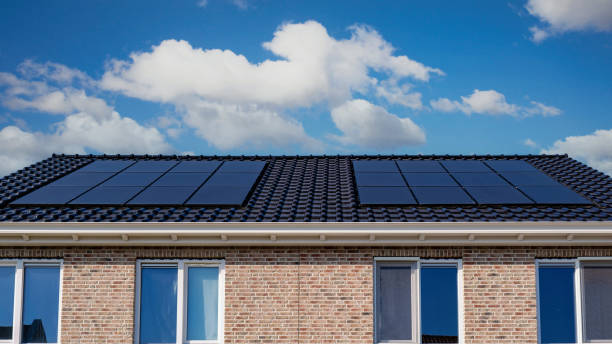
Efficiency Factors
Solar panels vary in efficiency. Higher efficiency rating panels maximize power output per area. In Castle Rock, CO, the degradation rate also plays an important factor. Over time, solar panels lose some efficiency.
Bifacial panels offer an edge. They harness light from both sides, boosting their solar generation potential.
Location Impact
Geographic location affects solar irradiance in Castle Rock, CO. More sunlight equals more power. However, shading from trees or buildings can hinder performance.
When assessing solar potential, factors such as the specific zip code in Castle Rock become crucial in understanding the local conditions that may impact energy generation.
Installation Angle
The angle of installation is key for optimal energy capture in Castle Rock, CO. It varies with latitude, and the season changes here. Fixed mounts have a general angle setting that works well throughout the year. Adjustable mounts offer flexibility to follow the sun’s path or direction for increased generation.
Panel Wattage
Panel wattage dictates information regarding electricity generation capability. High-wattage options produce more power and are ideal when roof space is limited in places like Castle Rock, CO. The number of high-wattage panels needed depends on your desired output level.
Average Power Output Range
Standard Conditions
Solar panels are rated under ideal circumstances, known as Standard Test Conditions (STC). These conditions include a consistent temperature of 25°C and solar irradiance of 1000 W/m2. However, the environment rarely aligns perfectly with these parameters.
In places like Castle Rock, CO, temperatures can soar above or drop below STC assumptions. This affects the panel’s efficiency. For instance, on a particularly hot day in Castle Rock, the panel’s output could decrease due to overheating.
Output Measurement
The effectiveness of rooftop solar panels is quantified by their power output in kilowatt-hours (kWh). Homeowners track this data daily, monthly, and annually to assess performance.
Castle Rock residents use monitoring systems for real-time insights into their energy production. These tools help identify trends, optimize energy usage accordingly, and provide a ranking of energy efficiency.
Additionally, they allow residents to track the amount of energy generated and consumed. For demonstration purposes, these systems showcase how various factors impact energy production and consumption in the community.
Calculating Your Rooftop Potential
Sunlight Exposure
Castle Rock, CO, enjoys varied sunlight hours. So, how much power do rooftop solar panels generate in the area? Direct sunlight is crucial for maximum power. Panels thrive with full sun exposure. Seasonal shifts change these hours. Winter days bring fewer light hours than summer.
Panels must avoid shade all day. Trees and buildings can block the sun. Ensure panels have a clear path to the sky from dawn until dusk.
Roof Space Analysis
The size of your roof in Castle Rock determines potential panel numbers. A large area allows more panels; a small one limits them.
Roof shape affects installation, too. Some roofs fit more panels due to their layout and pitch angle.
Your roof must be strong enough to hold the panel system’s weight without risk of damage or collapse.
Equipment Performance
Panel quality influences energy output significantly. Solar cells of high caliber work best.
Microinverters boost efficiency per panel by optimizing individual performance rather than an entire array’s average.
In Castle Rock, warranties maintain minimum power levels over time, ensuring investment security through guaranteed performance standards.
Factors Influencing Power Capacity
Ambient Temperature
Rooftop solar panels thrive under the sun, but excessive heat can be a foe. In places like Castle Rock, CO, summer temperatures soar and may hinder panel efficiency.
Solar panels are rated for performance in standard conditions, yet real-world temperatures often exceed these norms. To combat this, ensuring there’s sufficient airflow around your panels is vital; it helps to cool them down and maintain optimal operation.
Moreover, not all solar installations are equal in withstanding heat. Panels undergo testing across various temperature ranges to gauge their resilience. A well-ventilated setup will keep panels closer to ideal temperatures and prevent efficiency losses.
Inverter Efficiency
The heart of a rooftop solar system lies within its inverter—this device turns direct current (DC) into alternating current (AC). Yet, during this conversion process, some power is inevitably lost. The type of inverter you choose impacts overall system performance significantly.
Typically, homeowners decide between string inverters and microinverters. String inverters manage the output from multiple panels together, while microinverters handle each panel individually, offering improved efficiency, especially when shading is an issue on some of the modules.
Remember that an inverter doesn’t last forever; its lifespan should align with your system’s expected duration to ensure consistent energy production over time without significant drops due to worn-out equipment.
Maximizing Your Solar Output
Orientation Strategies
Roof orientation significantly affects solar panel performance. South-facing roofs are ideal in the Northern Hemisphere, as they receive the most sunlight throughout the day. Homeowners in Castle Rock, CO, with such an alignment, can expect optimal energy production.
East or west-facing panels won’t capture as much sun, but they aren’t a lost cause. With careful adjustments to their positioning, these orientations can still harness substantial power. Consider dual-tilt systems for homes that don’t have a south-facing option; this design maximizes morning and afternoon sun exposure.
Tilt Adjustments
The angle of your solar panels plays a crucial role, too. Seasonal tilt adjustments can greatly enhance solar capture by aligning with the sun’s position changes throughout the year. This flexibility ensures panels remain effective despite seasonal variations.
Fixed tilts are less complex to install but may not always hit peak angles for sunlight absorption. In snowy areas like Castle Rock, steeper angles help shed snow and debris off your panels, keeping them clear and efficient.
System Size Optimization
Choosing the right system size is paramount for efficiency in Castle Rock, CO, homes. Match your rooftop solar array to your household energy needs to avoid over- or under-sizing it:
- Proper sizing equates to meeting just enough of one’s consumption.
- Oversized systems without storage solutions lead to wasted potential.
- Undersized setups necessitate additional grid electricity or lifestyle changes.
Assessing Solar Panel Electricity Production
Energy Calculation
To gauge solar production, consider several factors. Panel efficiency and size are crucial. They determine how much sunlight converts to electricity. Local solar irradiance data is equally important. It reflects the sun’s power in a specific area, like Castle Rock, CO.
Historical weather patterns provide insight into potential energy levels. Knowing Castle Rock’s sunny days can predict future output accurately. Many turn to online calculators for estimates of system performance.
Storage Needs
Solar power isn’t constant; it wanes when the sun sets. In Castle Rock, CO, battery storage becomes essential for nighttime use or cloudy days. The capacity should align with daily solar production to fully benefit from your investment.
A properly sized battery ensures no wasted solar energy while increasing independence from the grid. However, adding batteries means higher initial costs but pays off with consistent power supply and savings over time.
Cost-Value Analysis of Solar Installations
Offset Maximization
Rooftop solar panels can be a significant investment. Net metering policies in Castle Rock, CO, enhance their value. These policies allow homeowners to get credits for excess electricity generated. This offsets their consumption costs effectively.
For example, during sunny days, surplus power reduces monthly energy bills.
Smart home systems further maximize these benefits. They manage energy usage intelligently to align with production peaks. Thus, homes use less from the grid when rates are high.
Time-of-Use Rates
Time-of-use (TOU) rates also play a role in cost-value analysis. TOU rates charge different prices at different times of the day or year. Homeowners should consume more when rates are low and export when they’re high. This strategy ensures maximum financial gains from your solar installation.
Monitoring and Maintenance for Solar Efficiency
Production Monitoring
Real-time monitoring is a key component in solar panel efficiency. It allows homeowners to detect issues quickly, ensuring they can be resolved without significant delays. This proactive approach prevents minor problems from escalating into costly repairs or downtime.
Moreover, data tracking confirms that the system’s output aligns with initial projections. Homeowners can compare actual performance against expected results, verifying their investment’s return.
Monitoring tools also play a crucial role in enhancing long-term performance. They provide insights on how to optimize the energy yield of rooftop solar panels based on usage patterns and environmental factors.
Maintenance Strategies
To maximize power generation, regular cleaning of solar panels is essential. Dust, leaves, or bird droppings can obstruct sunlight penetration if not addressed promptly. A simple routine of periodic cleaning keeps the surface of the panels clear for optimal operation.
In addition to cleanliness, inspection routines are vital for longevity and effectiveness. These inspections help spot wear or potential damage early on—before they impact overall productivity or necessitate expensive fixes.
Lastly, vegetation management ensures that trees and shrubs do not cast shadows over your panels throughout the day—a critical aspect since shading significantly reduces power output.
Tap into Solar Brilliance with Solar by Peak to Peak
At Solar by Peak to Peak, our expertise is evident in installing every solar panel. We understand the unique climate of Castle Rock, CO, and tailor systems for optimal performance. Our team ensures homeowners harness maximum power from their rooftop installations.
Return on Investment
Investing in solar technology offers more than just environmental benefits; it’s financially sound, too.
With our top solar solutions, customers see a compelling return on investment (ROI). They save money in the long term through reduced utility bills and potential tax incentives.
Our clients often break even within several years after installation. After that period, they enjoy virtually free electricity.
How Much Power Do Rooftop Solar Panels Generate?
Rooftop solar panels aren’t just a clean energy choice; they’re a smart investment in your home’s future. You’ve seen how factors like location and maintenance play pivotal roles in how much rooftop solar panels generate.
But remember, it’s not just about the tech specs—it’s about making an impact, slashing bills, and taking charge of your energy destiny. Imagine a sunny day not just as a pleasant forecast but as a personal powerhouse fueling your home. That’s the solar panel promise.Are you ready to bask in the benefits? Reach out today.
